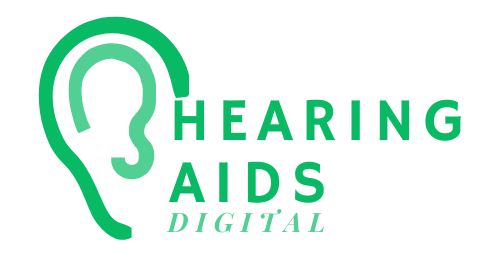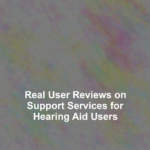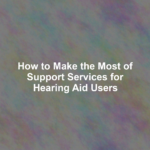As you adjust the volume, fine-tune the settings, and maintain your hearing aidG??s performance, youG??re not just optimizing a device; youG??re enhancing your daily interactions and overall quality of life.
ItG??s crucial to know that youG??re not alone on this journey. Various support services are available to assist you, each offering unique benefits tailored to your needs.
From professional audiology assistance that ensures your hearing aids are perfectly calibrated, to community support groups that provide emotional and practical advice, these resources are indispensable.
You might be wondering how to navigate these options and which service could best suit your lifestyle. Stay tuned to uncover the top services that can transform the way you utilize your hearing aids and interact with the world around you.
Professional Audiology Assistance
Seeking the expertise of a certified audiologist can significantly enhance your hearing aid experience, ensuring the device is tailored perfectly to your needs. The audiologistG??s role is more than just handing you a hearing aid; itG??s about providing a solution thatG??s customized for your unique hearing profile.
When you visit an audiologist, theyG??ll conduct a thorough hearing assessment. This isnG??t just a quick test; itG??s a detailed examination that pinpoints your specific hearing challenges. TheyG??ll ask about your lifestyle, the environments you frequent, and your comfort preferences. This information is crucial because it influences the selection and programming of your hearing aid.
Once theyG??ve gathered the data, theyG??ll recommend a device that fits your life. But it doesnG??t stop there. TheyG??ll adjust the settings to match your hearing loss patterns. YouG??ll be taught how to use and care for your device, which is essential for maintaining its performance.
Online Troubleshooting Guides
When your hearing aid starts acting up, online troubleshooting guides can be a quick and accessible resource to help you find a solution. Instead of waiting for a professionalG??s appointment, you can immediately start diagnosing the issue. Most manufacturers have dedicated support sections on their websites where youG??ll find step-by-step instructions tailored to your specific model.
YouG??ll also come across forums and community pages where users share personal experiences and fixes. ItG??s a space where you can ask questions and receive answers from peers whoG??ve faced similar challenges. YouG??re not alone in this, and sometimes the most effective solutions come from those who use hearing aids every day.
Remember to check for updates and patches for your hearing aidG??s software. Manufacturers often release fixes for common problems that you can download and install. And if youG??re still under warranty, these guides can help you figure out if itG??s time to reach out to the manufacturer for a repair or replacement.
Be sure to bookmark these online resources for future reference. With the right guide, youG??ll be back to clear hearing in no time.
Community Support Groups
Joining a community support group offers you the camaraderie and shared knowledge of individuals who truly understand the day-to-day realities of using hearing aids. YouG??re not alone in this journey, and thereG??s a wealth of experience out there that can help make your life easier and more enjoyable.
HereG??s what youG??ll gain:
-
Sharing experiences and coping strategies
-
Forming friendships with those who empathize
-
Reducing feelings of isolation
-
Practical Advice
-
Tips on maintenance and troubleshooting
-
Recommendations for accessory and device upgrades
-
Strategies for better communication in social settings
-
Latest Information
-
Updates on new hearing aid technologies
-
Information about rights and advocacy for the hearing impaired
-
Invitations to workshops and seminars
These groups can be found through local clinics, hearing aid providers, and online platforms. They often meet regularly, providing a consistent space for you to learn and grow alongside peers. So, take the step, find a group that resonates with you, and embrace the support network waiting to welcome you with open arms.
Hearing Aid Maintenance Services
To ensure your hearing aids function optimally, regular maintenance is essential. YouG??ve likely invested a good deal into these delicate devices, so itG??s crucial to keep them in top shape. Hearing aid maintenance services cater to this need by offering a range of support to prolong the life and performance of your hearing aids.
You can access professional cleaning services, where experts use specialized tools to remove earwax, moisture, and debris that might accumulate over time. DonG??t overlook this; even the smallest particles can interfere with the functionality of your hearing aids.
Furthermore, these services often include regular check-ups. Technicians can assess your hearing aidsG?? performance, ensuring theyG??re properly adjusted to your current hearing needs. They can also carry out repairs if necessary, replacing parts like tubes, tips, and filters, which can wear out or get damaged.
Remember, handling your hearing aids with care at home also plays a significant role. YouG??ll find maintenance services providing guidance on daily care routines and supplying you with the right tools, like drying kits or cleaning brushes.
Taking advantage of hearing aid maintenance services isnG??t just about upkeep; itG??s about ensuring you get the best possible experience from your devices. DonG??t hesitate to reach out to these services to keep your hearing aids in prime condition.
Assistive Listening Devices
Beyond keeping your hearing aids in excellent condition, consider exploring assistive listening devices that can further enhance your auditory experience in challenging environments. These devices are tailored to improve speech comprehension and reduce background noise, making it easier for you to engage in conversations and enjoy various media.
HereG??s a quick guide to some of the assistive listening devices that might benefit you:
-
Ideal for one-on-one interactions
-
Portable and easy to use
-
Amplify sounds closest to you while reducing background noise
-
FM Systems
-
Great for classrooms and lectures
-
Consist of a transmitter microphone used by the speaker and a receiver worn by you
-
Minimize distance and obstacles between you and the sound source
-
Infrared Systems
-
Perfect for private TV viewing
-
Sound is transmitted to your headphones or hearing aids via infrared light
-
Ensures clear audio without disturbing others
Take the time to explore these options and consult with your audiologist to determine which assistive listening devices align with your lifestyle and hearing needs. With the right tools, youG??ll be able to maximize your hearing aid use and enjoy a fuller, more accessible auditory world.
Conclusion
YouG??ve got a wealth of support at your fingertips! Reach out to an audiologist for expert help, dive into online guides when you hit a snag, and find solace and tips in community groups.
DonG??t forget, maintenance services keep your hearing aids in top shape, and assistive devices can enhance your experience. Embrace these resourcesG??theyG??re here to ensure your hearing aids are as beneficial and hassle-free as possible.
Lean on them and keep tuning into lifeG??s soundtrack!










